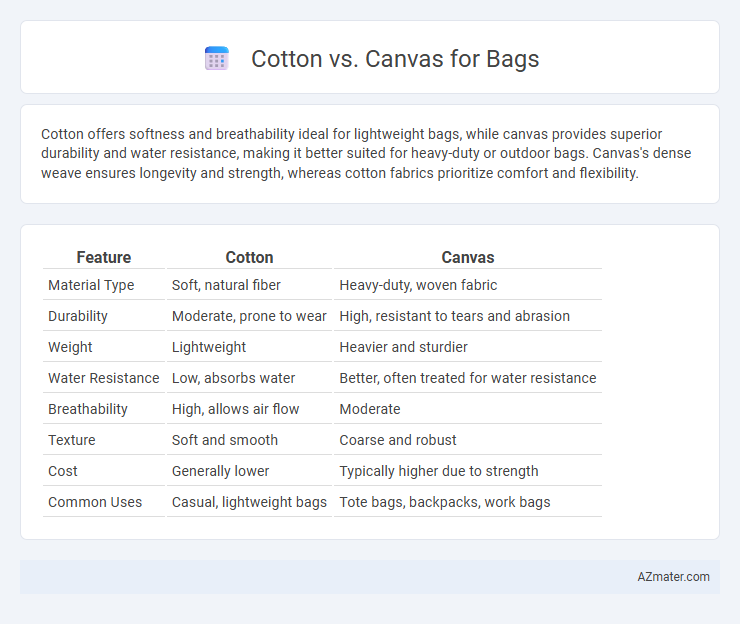Cotton offers softness and breathability ideal for lightweight bags, while canvas provides superior durability and water resistance, making it better suited for heavy-duty or outdoor bags. Canvas's dense weave ensures longevity and strength, whereas cotton fabrics prioritize comfort and flexibility.
Table of Comparison
| Feature | Cotton | Canvas |
|---|---|---|
| Material Type | Soft, natural fiber | Heavy-duty, woven fabric |
| Durability | Moderate, prone to wear | High, resistant to tears and abrasion |
| Weight | Lightweight | Heavier and sturdier |
| Water Resistance | Low, absorbs water | Better, often treated for water resistance |
| Breathability | High, allows air flow | Moderate |
| Texture | Soft and smooth | Coarse and robust |
| Cost | Generally lower | Typically higher due to strength |
| Common Uses | Casual, lightweight bags | Tote bags, backpacks, work bags |
Introduction: Cotton vs Canvas Bags
Cotton bags are lightweight, soft, and breathable, making them ideal for everyday casual use and easy folding. Canvas bags, made from heavy-duty woven fabric, offer superior durability and strength, suited for carrying heavier items and long-term use. Choosing between cotton and canvas depends on balancing portability versus ruggedness based on specific bag usage.
Material Composition: Cotton and Canvas Explained
Cotton is a natural fiber derived from the cotton plant, known for its softness, breathability, and lightweight properties, making it ideal for everyday bags that require comfort and flexibility. Canvas, traditionally made from cotton but sometimes blended with linen or synthetic fibers, features a thicker, tightly woven construction that enhances durability and water resistance, suitable for heavy-duty or outdoor bags. The choice between cotton and canvas materials impacts the bag's strength, texture, and maintenance, with cotton offering a more delicate feel and canvas providing long-lasting sturdiness.
Durability Comparison: Which Lasts Longer?
Canvas outperforms cotton in durability due to its tightly woven, heavy-duty fibers that resist wear and tear. Cotton bags tend to fray and weaken faster under heavy use, while canvas offers superior strength and longevity, making it ideal for daily or rugged use. High-quality canvas bags can last several years longer than standard cotton bags, maintaining their structural integrity over time.
Weight and Texture Differences
Cotton fabric is lightweight and soft, making it ideal for everyday casual bags that require flexibility and ease of carrying. Canvas, on the other hand, is heavier and has a coarse texture, providing durability and structure suited for tote bags or backpacks designed for heavy use. The denser weave of canvas enhances its toughness compared to the smoother, finer texture of cotton.
Environmental Impact and Sustainability
Cotton bags have a lower environmental impact if sourced organically, as organic cotton reduces pesticide use and conserves water compared to conventional cotton. Canvas, typically made from heavier cotton or a cotton-linen blend, offers greater durability and longer lifespan, which can lower overall environmental footprint by reducing the frequency of replacement. Choosing bags made from recycled or sustainably grown materials enhances sustainability by minimizing resource extraction and waste production.
Aesthetic Appeal and Design Options
Cotton bags offer a soft, natural texture with vibrant dye absorption that highlights intricate printed patterns and delicate designs, making them ideal for casual and stylish looks. Canvas bags provide a sturdy, textured surface that supports bold, graphic prints and customizable embroidery, favored for durability and a rugged aesthetic. Both materials enable diverse design options, but canvas excels in maintaining shape and showcasing structured, utilitarian styles.
Ease of Cleaning and Maintenance
Cotton bags are generally easier to clean as they can be machine-washed without losing shape, making stain removal straightforward. Canvas bags, while durable, require gentle hand washing or spot cleaning to maintain their texture and color, which can be more time-consuming. Both materials benefit from air drying to prevent shrinkage and maintain longevity, but cotton offers more convenience for regular cleaning.
Cost Analysis: Price Differences
Cotton bags typically cost less than canvas bags due to the lighter weight and lower durability of cotton fibers, making them more budget-friendly for short-term use. Canvas bags, made from tightly woven cotton or linen, demand higher production costs attributed to their thicker fabric and enhanced durability, resulting in a higher price point. Cost differences between cotton and canvas bags reflect the materials' respective lifespan and strength, influencing consumer choice based on usage needs and budget constraints.
Best Uses for Cotton vs Canvas Bags
Cotton bags excel in lightweight, everyday use like grocery shopping or carrying small personal items due to their softness and breathability. Canvas bags offer superior durability and structure, making them ideal for heavy-duty activities such as carrying books, groceries, or outdoor gear. Choosing between cotton and canvas depends on the need for portability versus strength and longevity.
Final Verdict: Choosing the Right Bag Material
Choosing between cotton and canvas for bags depends on durability and usage needs: cotton offers softness and lightweight convenience, while canvas provides superior sturdiness and resistance to wear. Canvas is ideal for heavy-duty use and long-term durability, especially in outdoor or daily-carry scenarios. For eco-conscious consumers, organic cotton bags present a sustainable, biodegradable option combined with comfort and moderate strength.

Infographic: Cotton vs Canvas for Bag
 azmater.com
azmater.com